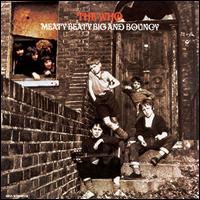The Who: Meaty, Beaty, Big and Bouncy (1971) by: sydburnz

The Who — Meaty Beaty Big and Bouncy (1971)
Roger Daltrey — harmonica, vocals
John Entwistle — bass, vocals, french horn
Keith Moon — drums
Pete Townshend — guitar, vocals
As an answer to the ever-popular Tommy album, the boys from London released this compilation to introduce America to the mod singles which made them stars in the UK. In the US, these singles and album tracks were never all that popular, except for “I Can See For Miles” which reached to number 9 on the charts. This was also the first compilation album in a long successive line of “greatest hits” to follow from the group. Meaty, Beaty, Big and Bouncy (or MBBB for short) is a truely unique affair. Many of these singles never made it to album before, and they showcase Pete Townshend at his early songwriting stage which makes them a little innocent, yet raucous at the same time. Anyone that is looking for the early Who singles that do not want to get the massive box set, 30 years of Maximum R&B, or the greatest hits compilations that focus more on the Fm orientated Who songs, should pick out this album. There are critics and Who fans alike who are more fond of their live material than their studio efforts. The Who didnt really try all that hard to make excellent albums like the Beatles. They just wanted to put something out in the studio to give them an excuse to go out on the road again. Their singles, though, are pure power-pop gems.
The album starts out with their very first single, “I Cant Explain”, which was an almost exact replica of a Kinks riff. This became a mod anthem and still holds yet today. The Who still performs this song in concert after almost 40 years. There were many covers and even Fatboy Slim sampled the song for “Going out of My Head”. Its indeed a timeless track. “The Kids Are Alright” is one of the most melodic songs from their debut album which does make an appearance on this compilation. The song showcases, perfectly, the tender songwriting side of Townshend. The harmonies couldnt have been any better, and of course Keith Moon has his trademark drum rolls within. Other songs which are very mod-influenced are “Anyway Anyhow Anywhere”, “A Legal Matter”, “Substitute”, and “My Generation”. Anyway, Anyhow, Anywhere was the single which showed the music industry what the group was trying to bring to the table. They were one of the forerunners of capturing feedback, fuzz, and a sense of raw energy in the studio, along with the Jimi Hendrix Experience. Nowhere, previously, was the energy more prominent than on this track. “Substitute” is one of my all-time favourite Who tracks, and has been a regular concert staple for years to follow. Of course, My Generation is the most well-known track on this album. It reached number 4 on the charts in the UK and made Townshend rethink about ousting Daltrey from the group.
“Happy Jack” is a humourous little pop-ditty that highlights the ever-present bass lines of Entwistle intermixed with the powerfull drum rolls of Keith Moon. Pure power-pop to the extreme!
As I stated before, “I Can See For Miles” makes an appearance on this album. This is listed as probably the best Who single ever, and there is no doubt about that. Townshend spat on the british record buyers though, for not making the single chart any higher than it did. He felt that the song was remarkably their best output, and I could never argue with that. This is the quintessential Who track at their best musically. I Can See For Miles is an energetic song about a guy who knows about his unfaithful companion.
“Pictures of Lily” is where Pete started to write about more mature subject matters. The song is about a boy who learns about masturbation, and he falls in love with a picture of a naked girl, who has long since been deceased, that his father gave him to release his sexual tensions. Entwistle plays french horn to accompany the music.
“The Seeker” is the most recent single from the compilation. It was released in 1970, and its very introspective on Townshends part. After reading the teachings of the prophet Meher Baba, Pete gained new inspiration. His songwriting started to reflect his yearning for spiritual enlightenment. The narrator is through with trying to follow hippie leaders such as Dylan, the Beatles, and Leary to follow more spirtitually inclined leaders such as the buddhist prophets.
Other tracks that appear on this album are “Magic Bus”, “Pinball Wizard”, “Im a Boy”, and Entwistle’s “Boris the Spider”. The album could have done without Pinball Wizard, but I can see why they released it on the album. The track was a high charting single in the US and the Tommy was the highest charting Who album up until that time. Id rather have seen Mary Anne with the Shaky Hands, or Tattoo possibly squeeze onto this album while taking off Pinball Wizard.
Again, this album is the ultimate album to get, if you can find it. It would be a nice piece to have on vinyl of course. This was the Who before they became regulars on album orientated radio due to their success of Who’s Next. This was a time where the Who showcased raw and intense music while still being very melodic in fact. Many punk and hard rock groups drew influence from their incredible power. The Who were perfect at writing 3 minute pop singles, and nowhere is it more apparent, than on this release.
Additional Info: The song, “Boris the Spider” was quoted by Jimi Hendrix as his favourite Who track. This infuriated Pete Townshend, because the track was written by his bass player, John Entwistle.
